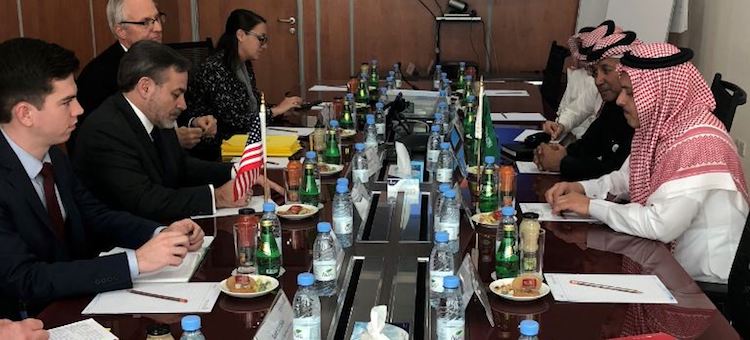By Shanta Roy
NEW YORK (IDN) – The Trump administration’s increasingly cozy relationship with Saudi Arabia has led to widespread speculation that the United States may be assisting the Saudis – directly or indirectly – to achieve their long term goal of acquiring nuclear weapons.
The speculation has been triggered by ongoing secret negotiations between the two countries to help Saudi Arabia gain access to nuclear energy in a proposed deal estimated at over a hefty $80 billion, according to a front-page story in the New York Times November 23. [P 15] ARABIC | GERMAN | JAPANESE | MALAY
The prime architect is the all-powerful Saudi Crown Prince, Mohammed bin Salman, whose original plans included the building of 16 nuclear power plants – subsequently reduced to two – over the next two decades.
In a detailed analysis of the Saudi plans, the Times posed the question: “Was the prince laying the groundwork for building an atomic bomb?”
Tariq Rauf, the former Head of Verification and Security Policy Coordination at the International Atomic Energy Agency (IAEA), told IDN Saudi Arabia’s formal interest in nuclear power plants goes back to 2006, when the Gulf Cooperation Council (GCC) countries announced a study on peaceful uses of nuclear energy in cooperation with France.
Reportedly, Saudi Arabia plans to build two large nuclear power stations over the next 20-25 years at an estimated cost of US$80 billion.
He pointed out that the King Abdullah City for Atomic and Renewable Energy (KA-CARE) was established by Royal Order of King Abdullah bin Abdulaziz Al Saud on April 17, 2010. In July 2017, the Royal Cabinet approved the establishment of the Saudi National Atomic Energy Project (SNAEP).
In April 2016, said Rauf, Saudi Arabia announced its “Vision 2030” that included an energy mix in which nuclear energy has a major role.
SNAEP calls for a nuclear programme based on: (1) large nuclear power stations; (2) small modular nuclear reactors; and, (3) a nuclear fuel cycle including uranium and thorium mining and subsequent stages through uranium enrichment.
A Nuclear Holding Company (NHC) is envisaged for these functions.
Rauf also said Saudi Arabia has in place nuclear cooperation agreements with Argentina, China, France, Russia and South Korea; and is reportedly pursuing nuclear cooperation agreements with the Czech Republic, the UK and the U.S.
An equally important question is: why does a country ideally suited for solar energy need nuclear energy? Is the latter a cover for the ultimate production of nuclear weapons?
Dr M.V. Ramana, Simons Chair in Disarmament, Global and Human Security at the School of Public Policy and Global Affairs at the University of British Columbia, told IDN the Trump administration’s actions show that it, once again, puts profits for its favored corporations ahead of any other considerations, including security or environmental sustainability.
“This deal is all the more unjustified because nuclear energy is a declining source of electricity around the world.”
He pointed out that nuclear energy also makes no sense for Saudi Arabia because the Kingdom can generate electricity much more effectively with solar and wind energy.
“Saudi Arabia has one of the highest Direct Normal Irradiation resources in the world. Thus, for Saudi Arabia to propose building nuclear plants and for the Trump administration to support this quest is perverse,” he declared. [ Visit also https://www.princeton.edu/~ramana/Saudi-Nuclear-Economics-2014.pdf]
Meanwhile, the U.S. president has continued to vacillate over the unceasing controversy about the killing of Saudi journalist Jamal Ahmad Khashoggi, who was murdered and his body dismembered with a bone saw, in the Saudi consulate in Istanbul, Turkey, last month (October).
Dismissing an assessment by the Central Intelligence Agency (CIA), which pointed an accusing finger at the Crown Prince as the brains behind the killing, Trump told reporters: “Maybe he did and maybe he didn’t”.
He also described Saudi Arabia as an economic and strategic partner, an important source of oil, a valuable customer of American weapons and a useful ally against Iran.
Brad Sherman, a Democratic Congressman from California and a member of the House Foreign Affairs Committee, was blunt: “A country that can’t be trusted with a bone saw shouldn’t be trusted with nuclear weapons.”
On Saudi Arabia’s future plans, Rauf said it is reported that Saudi Arabia is seeking a nuclear cooperation (or 123) agreement with the U.S. that will not hamper or limit Saudi Arabia’s rights under Article IV for the nuclear Non-Proliferation Treaty (NPT) for developing a complete nuclear fuel cycle that could include uranium enrichment and reprocessing of used/spent nuclear fuel.
This, he said, is unlike that concluded by the United Arab Emirates (UAE) with the U.S. in which the UAE committed not to develop enrichment or reprocessing capabilities and to buy nuclear fuel for its reactors from the global nuclear market (referred to as the “gold standard”).
Under the Obama administration, the U.S. was pushing for Saudi Arabia to conclude a 123 agreement based on the so-called “gold standard” but now under the Trump regime reports suggest that the U.S. may conclude a 123 agreement with Saudi Arabia that would not prohibit enrichment and reprocessing?, said Rauf.
Explaining further, he said that on June 16, 2005, Saudi Arabia signed a safeguards (Nuclear verification) agreement with the IAEA pursuant to the NPT but this agreement included the “Small Quantities Protocol” under which the IAEA has suspended nuclear verification in Saudi Arabia until the time that the country has nuclear material and nuclear facilities.
“The safeguards agreement entered into force on January 13, 2009 and from that date until now the IAEA has not carried out any safeguards inspections in Saudi Arabia,” he declared. [IDN-InDepthNews – 30 November 2018]
Photo: U.S. Deputy Minister of Energy Pays a Visit to King Abdullah City for Atomic and Renewable Energy (KACARE). January 2018. Credit: KACARE




